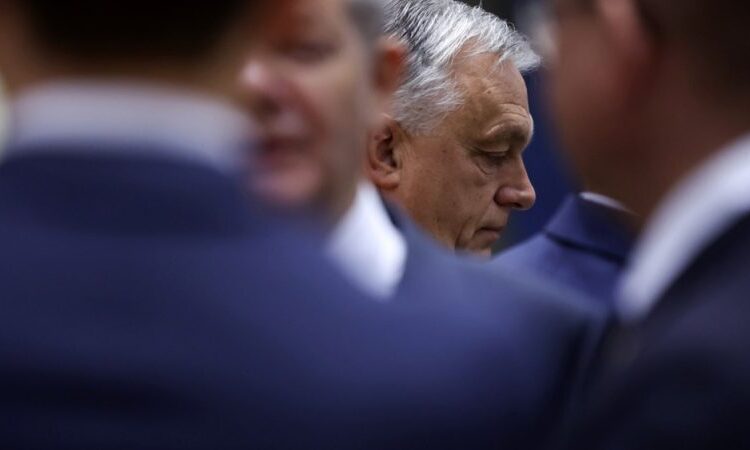
While Brussels has been working to solve the Hungarian blockade since Prime Minister Viktor Orbán vetoed the EU’s Ukraine aid package in December, the bloc’s officials now have prepared a potential compromise in exchange for dropping his veto.
Senior EU officials have started to signal they might be open to including a mid-term review of the four-year support package next year, in 2025, which would give him an option to object to the funding package, according to people familiar with the discussions.
This would also include a so-called “emergency brake” mechanism that any member state could activate if it has concerns and request a debate on the matter, they said.
“We have engagement [with Hungary] and that is a positive,” an EU official involved in the talks said Thursday.
The push comes after EU member states agreed on Wednesday (10 January) on a partial negotiation mandate to start talks with the European Parliament on a €50 billion aid package for Ukraine, though Hungary has threatened strings attached to lift its veto at next month’s emergency summit.
The original proposal of the European Commission for the EU’s financial aid package aimed to give Ukraine a predictable cash flow over four years, including €17 billion in grants and €33 billion in loans.
Hungary signalled it could approve the funding as long as the €50 billion package would be split into four annual envelopes worth €12.5 billion each, according to several EU diplomats with knowledge of the negotiations.
Several EU member states are against deciding the issue on a year-to-year basis as they believe it would deny Ukraine long-term planning ability and would effectively give Budapest the option of an ‘annual veto’.
The EU diplomats said that Budapest has also made an unrelated demand about the bloc’s COVID-19 recovery funds (RFF)
While the EU will try to convince Budapest to lift its veto of the Ukraine financing, the leaders are also eyeing alternatives, including an EU26 agreement without Hungary.
“Our plan is still to have an agreement with EU27,” the EU official said.
A preference would be to avoid alternative arrangements to bypass Hungary, which could include options to prolong the existing 2023 loan scheme for up to a year, raise common debt backed by national guarantees, or create a special financial vehicle to disburse grants, according to several EU diplomats and officials with knowledge of the discussions.
Leaders pilling pressure
With under three weeks to go until the EU’s emergency summit, EU and Hungarian officials are working to ‘see what could be agreeable’, according to people familiar with the discussions.
“We have been presented with the requests of Hungary, but at least we have engagement (…) of course, what is being requested might be very difficult and unacceptable for others,” an EU official said.
Some EU member states, including Italy, have also cast doubt on the idea of splitting the additional EU funding for Ukraine from the EU budget review, which is meant to top-up funding in other areas, such as migration management and investments in defence.
Italy’s Prime Minister Giorgia Meloni has been seeking to convince Orbán to lift his opposition to the EU’s support for Ukraine and to improve relations with President Volodymyr Zelenskyy, according to people familiar with the discussions.
Underscoring Meloni’s foreign policy ambitions, this also comes with an eye towards the European elections in June and a potential boost to the far-right European Conservatives and Reformists (ECR), which observers say could pave the way for Orbán’s currently unaffiliated Fidesz party to join.
US ‘disappointed’ by Hungary
Additional pressure for Hungary to agree to Ukraine funding is coming from the US, with Washington saying it is “disappointed” by Orbán’s Ukraine policy.
“I think we’re disappointed that (…) Prime Minister Orbán has chosen to stand alone in the European Union in questioning the fight to support Ukrainians,” Jim O’Brien, the US State Department’s Assistant Secretary for European and Eurasian Affairs, told reporters in a briefing on Thursday.
Relations between Budapest and Washington over the past year have also soured due to Hungary’s foot-dragging over the ratification of Sweden’s NATO accession and also over Orban’s warm ties with Moscow despite the war in Ukraine.
The senior US officials also said he looks forward to Budapest fulfilling its promise not to be the last to ratify Sweden’s NATO accession.








